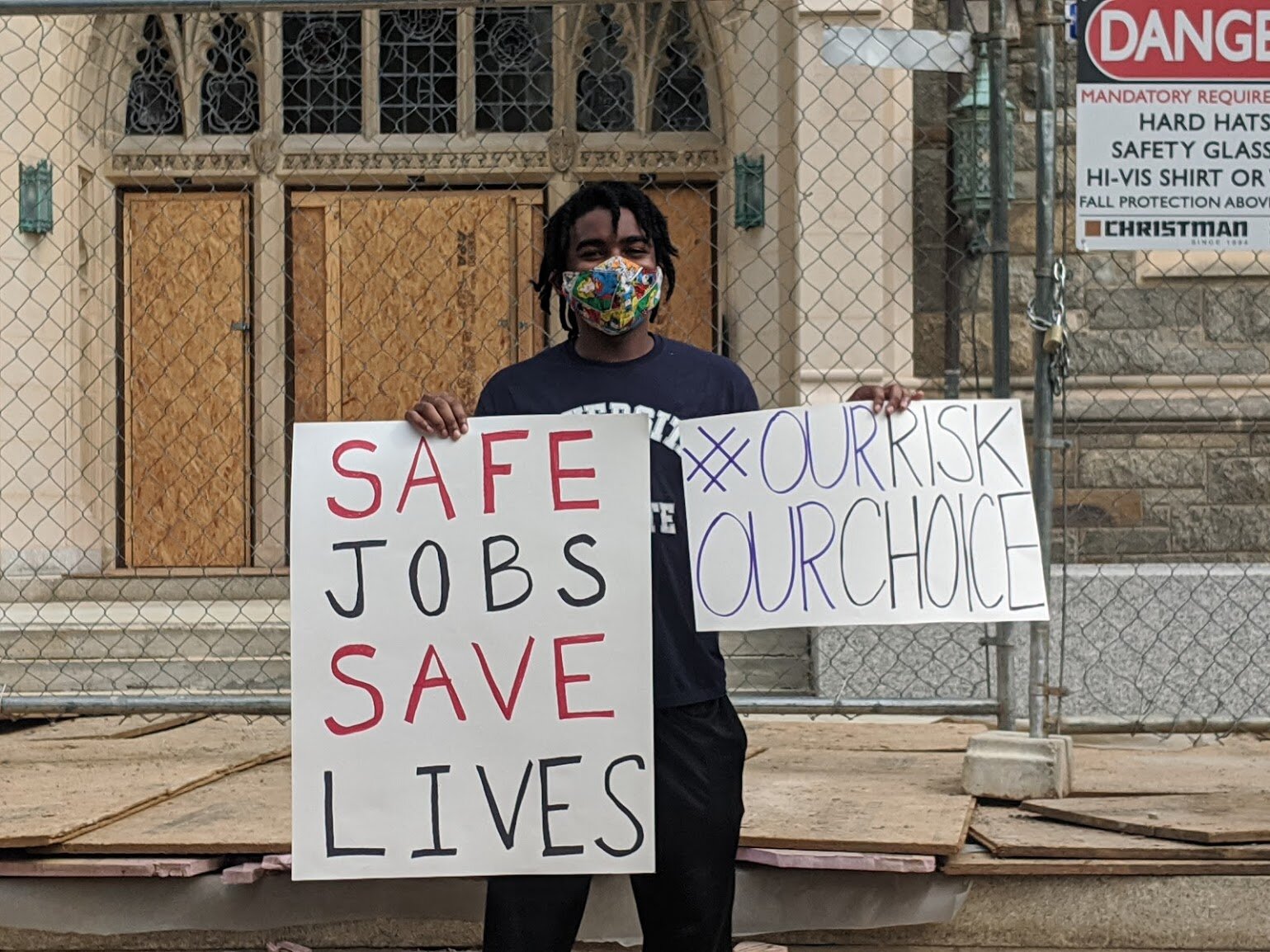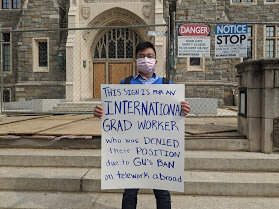Impact bargaining faq
On March 25, 2021, GAGE and the University agreed on three COVID-19 side agreements. Please refer to the Grad Worker Rights during COVID-19 webpage.
The FAQ below was last updated February 24, 2021.
+ What are the concerns GAGE seeks to address through impact bargaining?
GAGE has proposed:
- The University ensure no-cost vaccines for all grad workers, regardless of citizenship status.
- The University does not place the cost burden of COVID-19 testing, face masks, and other PPE onto grad workers expected to work on campus.
- Grad workers who test positive for COVID-19 have the option to relocate to university isolation space.
- The Community Compact does not constitute a liability waiver or assumption of risk by any grad worker.
- In anticipation of hybrid classes, teaching assistants and instructors will have a say and right to request modification for class meeting conditions, including number of students meeting in person for class, frequency of in person meetings, and the conditions of the classroom (air circulation, room size, etc).
GAGE members are welcome to reach out to review and provide feedback on the bargaining proposals and to attend impact bargaining sessions.
+ Why can GAGE bargain over the impacts of Georgetown's COVID-19 response?
On January 18, a neutral third party Arbitrator ruled that GAGE had the right to bargain over COVID-19 impacts and that the Georgetown Administration had violated its obligation to bargain with GAGE.
Article III, Section 9 of our Collective Bargaining Agreement allows GAGE to demand that the University bargain over topic(s) before our contract expires under two conditions: (1) the topics are related to mandatory subjects of bargaining so long as (2) those subjects were not raised or discussed in the negotiations that led to the current contract.
Before the Arbitrator ordered Georgetown University to bargain with GAGE over COVID-19, the Administration wrongly claimed that because our Collective Bargaining Agreement was signed on May 1st, 2020, GAGE didn't have the right to bargain over the impacts of COVID-19. This was a heartless and willfully misleading position that we were able to disprove. We have detailed notes from bargaining to show that COVID-19 was itself not substantively discussed as a factor to consider when writing contract language. GAGE expected – and we assume the University did as well – that the severity of the pandemic would decrease as time went on due to the stringent social distancing measures in place at the time our contract was ratified. Both GAGE and the University negotiated certain provisions of the contract without thinking about the possibility of working during a global pandemic that worsens daily.
+ Why does GAGE seek a formal COVID-19 agreement through negotiations? Why aren’t university policies good enough?
A COVID-19 agreement would be a binding document, co-created by GAGE and the Administration. It would represent mutual understanding about graduate work during the pandemic. Neither party could change the terms of the agreement on their own. Only a COVID-19 agreement could give us certainty about our working conditions and a mechanism for holding the administration accountable to its policies for the duration of the COVID-19 pandemic.
+ What were the concerns GAGE raised in August 2020? How did the Administration respond?
Guaranteed Option to Work Remotely during the COVID-19 pandemic: Graduate workers need a transparent and equitable policy that guarantees each of us a remote work option and does not force us to choose between protecting their health and receiving their income and benefits. There is no way to predict whether a graduate worker who contracts COVID-19 will be asymptomatic, have a mild case but then endure serious long-term health problems, experience severe symptoms that require hospitalization, or die. Each graduate worker must be able to determine their own risk and comfort with resuming in-person work, and not be cornered into risking their health by Administrators who prioritize tuition projections or grant revenues over graduate student health.
The administration's policy falls short in addressing our concerns. If Departments fail to assign PhD students with teaching and/or research duties to remote work, their policy effectively forces PhD students to take unpaid personal leave. Personal leave here means leave not just from service, but also leave from academic work. Don’t assume this would be a rare circumstance: after Georgetown announced their initial plans for hybrid courses and research restart, we ran a survey that revealed 50% of PhD student respondents were concerned that they would lose their stipend and healthcare if they were unwilling to take the risk of catching COVID-19 by working on campus.
On July 29th, GAGE proposed to the Administration that we create a pandemic protection leave from assistantship that provides support for PhD students whose departments fail to assign to remote work. Importantly, this leave would be from service duties only, not from coursework or dissertation work as personal leave in the current policy requires, and we could negotiate what level of financial support could be provided. Our proposal was an opportunity for the Administration to develop a compassionate, equitable policy to ensure no PhD assistant lost their job due to health risks during this pandemic.
The Administration responded by wrongly denying GAGE’s right to negotiate and refusing to reach a formal agreement. We see the policy includes language that GAGE will be consulted if the policy needs to be extended for Spring 2021, but this is an empty promise that is further undermined by the Administration’s conduct towards GAGE this summer. We have to ask ourselves: Why is the Administration so deeply invested in avoiding putting this policy in a binding agreement with GAGE?
International Graduate Students Working Abroad: GAGE proposed that the Administration guarantee work for graduate students teaching or conducting research who meet minimum eligibility requirements for university work, including an active visa, permanent residency, or US citizenry, a US bank account, and current residency in a country approved by the University’s General Counsel and University Information Services. We proposed a transparent process by which the Administration would notify GAGE of any updates to these eligibility requirements. In March, the Administration encouraged international students to return to their countries of origin. This policy would ensure that the Administration made good on its promises to support international workers despite the persistent uncertainty surrounding immigration policy and anti-immigrant discrimination throughout the United States.
The Administration responded by making unilateral changes to its employment policies for remote graduate students abroad that cut GAGE out of the process entirely. Days before teaching assistants were set to begin their courses, graduate workers abroad received notifications from their departments that the Administration was removing them from their positions and converting them to non-service fellowships. We’ve heard reports of these actions from graduate students in Canada, the United Kingdom, Germany and Spain. In many circumstances, graduate students only later learned that these decisions meant that the non-service fellowships that the Administration had previously committed to providing them later in their PhD programs would no longer be available. To date, the Administration has not provided a transparent or equitable justification for these decisions.
Sick Leave for Graduate Workers who get COVID-19: GAGE proposed paid sick leave for graduate workers for the duration of COVID-19 illness, with willingness to negotiate around specifics. The current medical leave policy set in our contract does not provide for any sick leave for Master’s students working in hourly positions and limits PhD students to six weeks of paid medical leave.
Evidence over the summer has revealed that the terms set in our contract are inadequate for the severity of COVID-19 illness. In June, the New York Times reported that a woman in her 20s, with no serious underlying health conditions, was hospitalized for over two months and received a double lung transplant. On July 31st, the CDC published that 20% of COVID cases among otherwise healthy 18-34-year-olds had not recovered 2-3 weeks after testing.
When we brought these concerns to the representatives of the Administration, their response was, verbatim, that we should “wait and see.” They were unwilling to create a new category of leave for COVID-19 illness. Rather than prepare for the worst, the Administration would rather let people fall ill and direct them to apply for emergency funds that are limited and not guaranteed. Our proposal was an opportunity for them to live up to values of care of the whole person on which the Georgetown community prides itself, and they failed.
Ensuring Protections for Graduate Workers on Campus: For graduate workers who have returned to campus to conduct lab research, GAGE proposed that the Administration continue to shoulder the burden of public health protections for the duration of the COVID-19 pandemic. Since the beginning of the semester and the uptick in COVID-19 cases on the Georgetown campus, the Administration has imposed a series of necessary public health requirements for workers on campus and graduate students residing in surrounding neighborhoods. These include once or twice-weekly COVID-19 tests and the regular use of personal protective equipment. Currently, the Administration has accepted responsibility for the financial cost of COVID-19 testing. With no end to the pandemic in sight, we sought to ensure that the Administration continued this commitment to the upkeep of a safe and healthy workplace.
The Administration has also asked all members of the Georgetown community to sign a “community compact” that shifts responsibility for the maintenance of public health from the Administration itself to the individual graduate worker. Across the United States, employers have cynically used these agreements to absolve themselves of their legal responsibility for a safe and healthy workplace that minimizes the risk of COVID-19 exposure. GAGE’s proposals about graduate work on campus sought to protect graduate workers from legal risks that the Administration themselves should bear.
The Administration responded with the same “wait and see” argument that they used in response to our COVID-19 sick leave proposal. These responses demonstrate that the Administration is more concerned with protecting itself from legal and financial risk than the public health of the Georgetown community.





